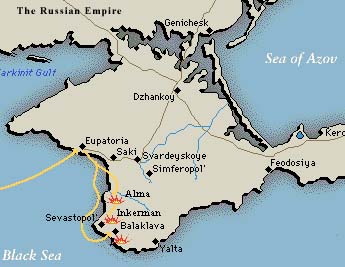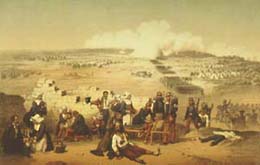|




The Crimean War

In the years 1854 to 1856, Britain fought its only European war between the ending of the Napoleonic conflict in 1815 and the opening of the Great War in 1914. Although eventually victorious,the British and their French allies pursued the war with little skill and it became a byword for poor generalship and logistical incompetence. The war began in March 1854 and by the end of the summer, the Franco-British forces had driven the Russians out of Wallachia and Moldavia. The fighting should have ended there, but it was decided that the great Russian naval base at Sevastopol was a direct threat to the future security of the region and in September 1854 the French and British landed their armies on the Crimean peninsula.

From their landing beaches the allies marched southward to invest Sevastopol. On the way they fought their first major battle. At the River Alma, a Russian army tried unsuccessfully to prevent the Allies crossing the river and scaling the heights beyond. The defeated Russians retreated inland and as the siege of Sevastopol began a regrouped Russian army hovered menacingly on the flank of the British army who were using the inlet of Balaklava as its supply harbour. Sevastopol was invulnerable to any kind of seaborne attack and her landward defences were also formidable. Soon the major strongpoints in the defences, the Redan, the little Redan and the Malakoff bastion, would become household words in Britain.



A further attempt by the Russians resulted in the Battle of Inkerman, a murderous fistfight fought out in a fog so thick that sometimes the troops could only see a few yards ahead. again the Russians were pushed back. The war settled down to one of spade and artillery as the Allies pushed their trenches nearer the defensive lines of Sevastopol. The winter of 1854-55 brought great misery to the troops, particularly the British as their commisary department was grossly incompetent and for months the men were clothed in rags, cold, hungry and short of everything. The only bright light in this sorry tale of official negligence and stupidity was the work of Florence Nightingale who almost singlehandedly drastically cut mortality rates for the Britsh wounded at the hospital in Scutari. Finally, in early 1856, Sevastapol fell and the war was brought to a conclusion by the Peace of Paris.



 

|